Foodie Guide to Japanese A5 Wagyu
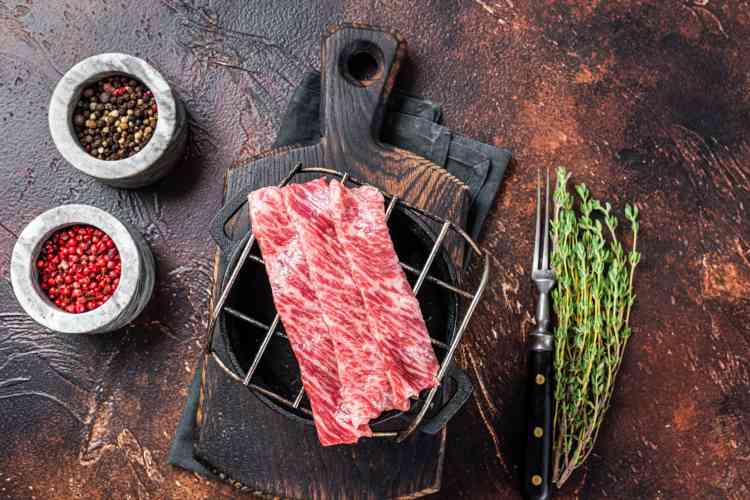
Japanese wagyu is prized for its fatty, marbled texture that practically melts in your mouth, but Japanese A5 wagyu takes it to another level. With the highest of marks on the beef rating system and a reputation as exquisite as its flavors, A5 wagyu is indeed a common delicacy on foodie bucket lists worldwide.
Now you may be thinking, “Wait, I know what wagyu is, but how does the wagyu grading system work, and what does A5 even mean?” Some would say that A5 wagyu steak is an indescribable experience, but we’ll do our best to explain it here.
Here’s everything you need to know about the incredibly tender, rare and luxurious Japanese A5 wagyu beef.
Jump to Section
- What Is Japanese A5 Wagyu?
- What Is Special About A5 Wagyu Beef?
- How Much Does A5 Wagyu Beef Cost?
- Where to Buy Japanese A5 Wagyu Steak?
What Is Japanese A5 Wagyu?
Japanese A5 wagyu is the best possible cut of wagyu beef. The Japanese Meat Grading Association gives all beef both a yield grade — how much lean, salable meat is available from each carcass — and a quality grade — how well the beef meets a particular set of standards. An “A” is the highest yield grade, and 5 is the highest quality grade.
Wagyu in general is already considered one of the best meats in the world, but the ranking system still applies to this rare beef, and some wagyu cuts are ranked better than others. Japanese A5 wagyu beef is quite literally the best of the best in terms of quality, color, texture and flavor. And A5 olive wagyu, sourced from cows that are fed caramelized olive pulp, is the rarest cut of steak in the world.
If you’re planning a trip to Japan, you just have to sink your teeth into some Japanese A5 wagyu, but if you’re a homebody and a foodie aching to try this exquisite beef, you might search for wagyu cooking classes near you instead. From cooking classes in NYC to cooking classes in Vancouver, finding a word-class chef to teach you how to prepare delectable wagyu beef has never been easier.
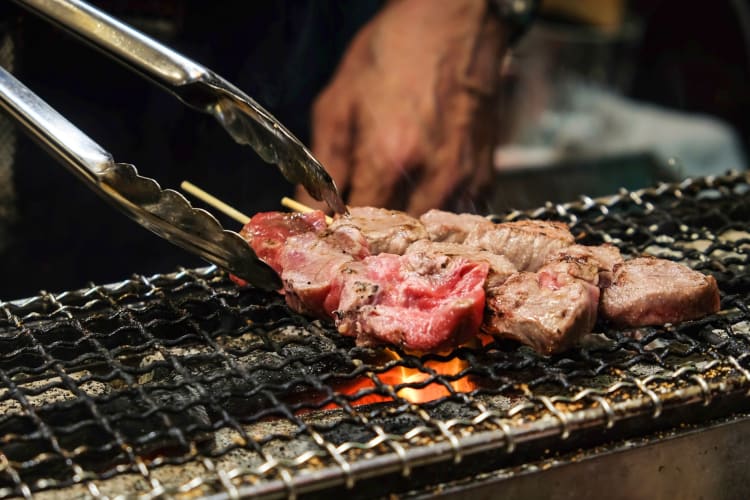
What Is Special About A5 Wagyu Beef?
Much like the United States, Japan grades their meat based on four categories: firmness, texture, meat color and fat color. They use a numbered ranking system from 1 to 5, with 5 being the highest quality grade. Japan further defines each quality grade with a yield grade of A (above standard), B (standard) or C (below standard). In all four categories, Japanese A5 wagyu earns a quality grade 5 and a yield grade A.
As a whole, wagyu beef is already praised in terms of meat quality. It is especially prized for its rich, rare, fat-marbled texture resulting from a meticulous diet and stress-free environment.
In addition to earning a quality grade and yield grade, wagyu is often assessed on a beef marbling scale (BMS). According to the Japanese system, BMS falls anywhere between 3 and 12, with 3 being barely marbled and 12 being extremely well-marbled. In order to be called A5 wagyu, the meat must have a BMS score between 8 and 12.
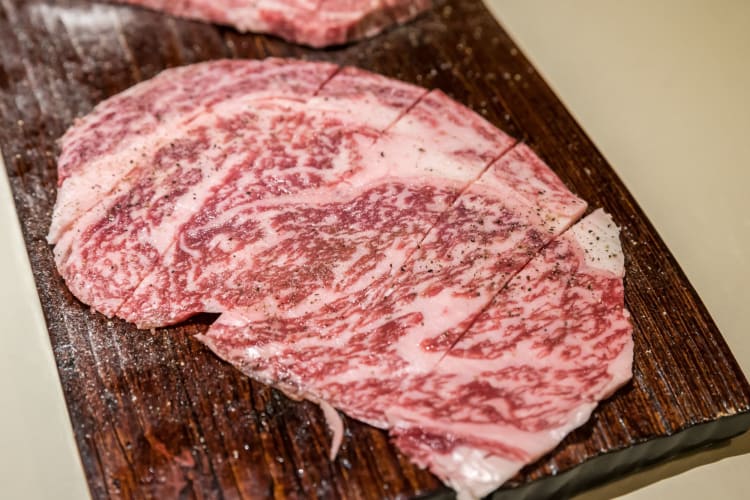
So what’s the difference between Japanese A5 wagyu and beef rated as A4 or A3 wagyu? The meat has to earn a 5 out of 5 in every category plus have a high BMS score to be called A5 wagyu. For example, if a cut of wagyu ranks a 5/5 in everything, but only a 4/5 in fat color, then it can only be called A4 wagyu beef.
In every way, Japanese A5 wagyu beef is the highest possible grade of wagyu beef. There is no better wagyu in the world — and arguably no better meat in the world — than Japanese A5 wagyu beef.
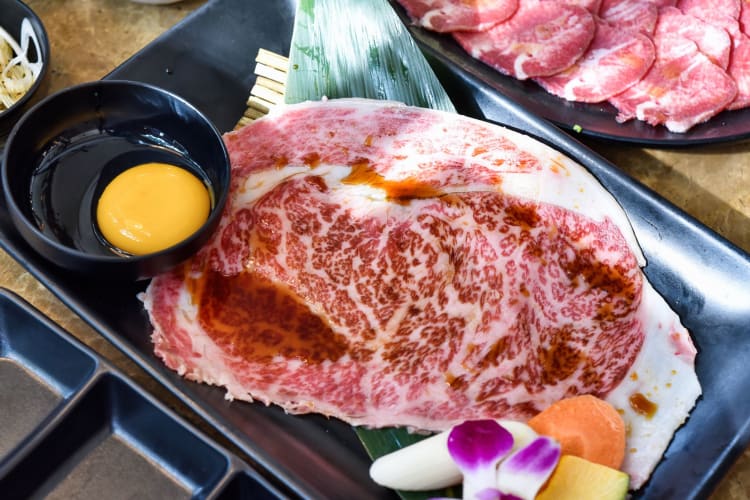
How Much Does A5 Wagyu Beef Cost?
Japanese A5 wagyu isn’t your standard steak, so expect to pay a pretty penny if you want a bite of this rare delicacy. Prices may vary depending on your location and serving style, but A5 wagyu beef typically costs in the realm of $250 per pound. Cuts of A5 olive wagyu, the rarest steak in the world, can cost as much as $300 or more per pound. There are a number of reasons why wagyu beef is so expensive, and most steak connoisseurs agree it's worth the splurge. Still, if it’s your first time trying wagyu beef, you may be better off purchasing a bite for about $20-30 per ounce at a restaurant.
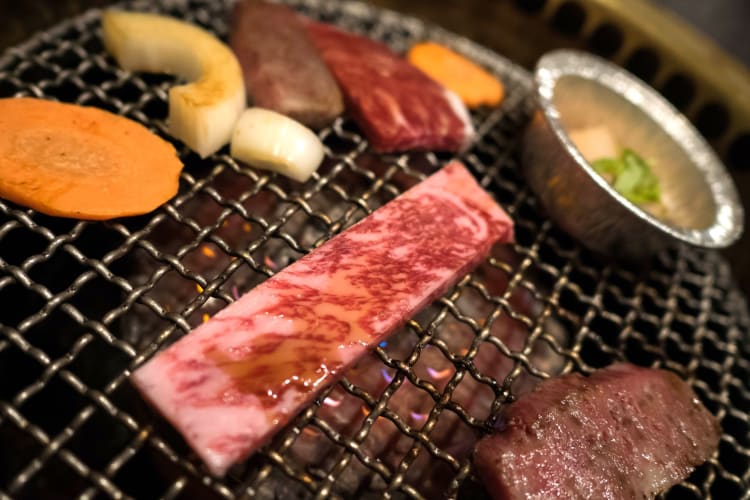
Where to Buy Japanese A5 Wagyu Steak?
Japanese wagyu beef can only be sourced from very specific breeds of cattle: Japanese Shorthorn, Japanese Polled, Japanese Brown and Japanese Black. Steaks labeled “wagyu” in the United States and other countries are usually crossbred with domestic cattle, and therefore not full-blood Japanese wagyu.
When buying wagyu beef outside of Japan, be careful to distinguish between grading systems. Some countries will call wagyu beef an “A5” based on their own system, but the meat might actually equate to a B3, B4 or lower on the Japanese scale.
Real Japanese A5 wagyu beef must be raised, slaughtered and scored by the Japanese Meat Grading Association. Any real wagyu beef you can find in the United States has to be imported from Japan, so it’s very difficult to find. With that being said, you may be able to find real Japanese A5 wagyu steak at online retailers or exclusive restaurants. Always be sure to research the company and be wary of prices that seem too good to be true. When you do find a trustworthy source, you've unlocked the potential for incredible culinary experiences or unforgettable gifts for meat lovers in your life.
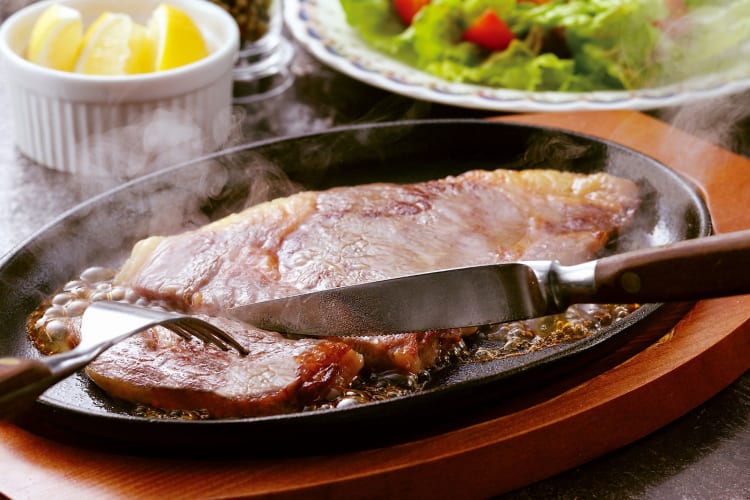
From the strict diets of the cattle to the detailed BMS grading, every step behind A5 wagyu is carefully controlled to create cuts of steak you’ll remember for the rest of your life. We hope this article has helped you understand just how special Japanese A5 wagyu really is and why everyone ought to experience a mouth-watering bite at least once in their lifetime!
For even more ways to explore your favorite foods, check out other experiences happening on Cozymeal.
